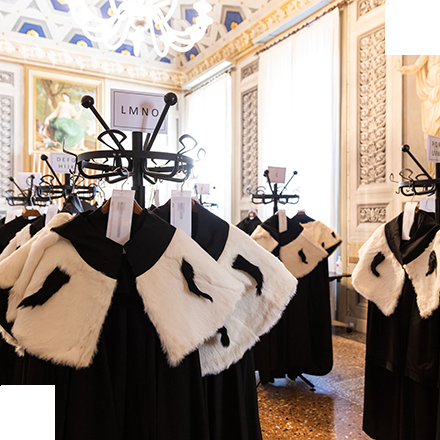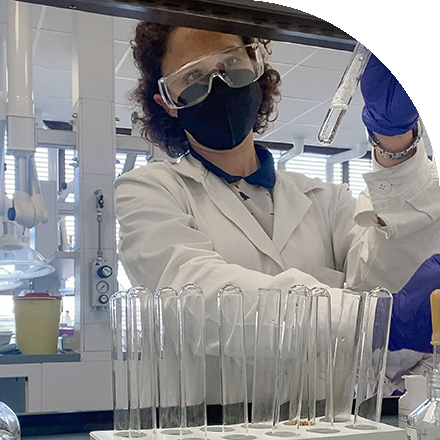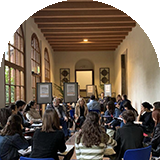Università Cattolica del Sacro Cuore Largo A. Gemelli, 1 - 20123 Milan
Simona Ferrari
Since I was a child, I have always been fascinated by the world of entertainment. I used to watch "They'll Be Famous," the TV series, and I dreamed of becoming a dancer and living in New York. Unfortunately, I didn't have a great talent for dancing, so I tried to be a stage actress. In high school, I joined the school's theater group and later a theater company, but again with very little success. I did much better in school books but I absolutely wanted to combine my passion with what I knew how to do best, which was studying. So I enrolled in Modern Literature at Università Cattolica, because it offered not only an excellent education but also had a film department.
I asked Professor de Marchi, then professor of Theory and Techniques of Cinema, for my thesis, as I wanted to focus my discussion on the cinema of blaxploitation, the African-American cinema of the 70s. I graduated on December 20, 2005, followed first by Prof. Garbellini and then by Locatelli, as Prof. Bruno De Marchi unfortunately passed away before I could finish. But what to do now? I knew I wanted to work in film, I still dreamed of living in New York but I didn't know anyone who could help me achieve at least one of my dreams. In reality, I was working at Eni, so in a completely different sector, and I was living in San Giuliano Milanese, not really New York City.
I decided to take film and editing courses after work. I realized that editing was the part of the process that I was most good at, because it allowed me to combine technology and the ability to tell stories using creativity and intuition. Another year passed and finally, through one of the courses I had taken, I found an internship in a small production company, Ondevisive, which mainly dealt with documentaries and TV pilots, but for the most part earned money by editing weddings and communions. I was through the roof! I used to go to the studio in the evenings after work and on weekends. After a few months I made the decision to really try and I left the chemical company where I was working at the time to try to pursue a career as an editor. I was earning 500 euros a month and everyone thought it was crazy, that I would never make it because I didn't really know how to do that job and anyway I didn't know anyone in the entertainment world. On the other hand, we are still in Italy, they told me, you know that here without knowledge you don't go anywhere. But I wanted to try anyway, there was always time to go back if it didn't go well.
The guys at Ondevisive were giving me confidence, maybe I could do it instead. After about 9 months, however, I really needed to find a more lucrative job and finally a friend, for whom I had mounted some personal projects, put me in touch with another production company that worked for Mediaset and Rai.
The production company was Quadrio TV , created and managed by Claudio Cavalli. I was hired immediately and I started working for the program "Scorie" conducted by Nicola Savino which was broadcast live in the late evening on Rai 2. I edited short reports of a few minutes that were aired during the broadcast. In Quadrio there was always a great ferment and a great desire to produce new content. When one program was finished, another one would start immediately. In addition, Quadrio began producing the 'Mystery' series. For this program I initially took care of editing only the services but later Claudio decided to entrust me with the direction of the exteriors as well, and I began to travel in Italy and around the world to tell stories. Now I could finally say that I was doing the job I liked, and maybe half of my dream I was making it come true. But New York? I started to think that if I made it this far I could try to go even further and cross the ocean in search of fortune. During the 8 years I worked at Quadrio, every summer, during the month of closure, I flew to NY in the hope of meeting someone who would offer me a job opportunity. Of course, I couldn't find anyone willing to hire me without a work visa. It was time to come up with plan B: get a visa. I saved the money and hired a lawyer to help me in the process, which turned out to be long, complicated and exhausting due to the amount of evidence that must be produced to prove that I have the famous extra gear that allows you to obtain the O1 visa, for 'Extraordinary abilities in your field'.
After a year and a half of anxiety and waiting, I finally received confirmation that I had obtained my visa and decided to leave in July 2015. I left behind friends, family and work but now I had also fulfilled my second dream, living in New York. I spent 7 months sending out dozens of resumes a day, answering ads and going to meetings to meet other people in the industry. I didn't get any answer, maybe I had to start over, leave all the past behind, even work, as frustrating and painful as it was, I had to start from scratch. One day in February 2016, I got a phone call: "Hi I'm Larissa from HBO, I'm a fan of you!" I couldn't believe it! They were offering me 4 days of work as an Assistant Editor for a documentary at HBO. I had my first job in the United States! They called me back for a longer period and then recommended me for another documentary, this time for National Geographics, which was called Free Solo, again as an assistant editor.
Before I moved to New York, I imagined what it would be like to live there. I imagined a lifestyle like you see in TV shows, shiny and full of sequins. In reality, New York is a very tough city, which goes at a thousand miles an hour and to stay afloat you have to go at two thousand miles an hour. You need to learn how to communicate effectively with people who don't always understand that it's not so easy for you to express yourself as you would be able to in your own language. And you have to be able to adapt to a completely different mentality from the Italian one, certainly more pragmatic and sectorial. It's true, if you commit yourself and work a lot in the United States you certainly have more chances to get to the top, but this also means making many sacrifices and working days, nights and weekends, often more than a job at the same time. And so it was for the two and a half years I worked on Free Solo, certainly the most fulfilling and intense project I've ever done. Free Solo is a documentary about climber Alex Honnold, the first athlete who managed to climb El Capitan with his bare hands in Yosemite Park in California.
To succeed in this feat he worked very hard for years, that day he could do absolutely nothing wrong. And like Alex, the whole team, including me, has been committed to the same level, each in their own sector, striving for excellence. The film was not accepted at Sundance or even Cannes in 2018. We kept working on it. The premiere was at the Telluride Film Festival at the end of August 2018 and from there the film won one award after another until it reached the 2019 Oscars. When they opened the envelope for the winner of Best Documentary and said the name 'Free Solo' I understood and despite everything you always have to follow your dreams because somewhere they always take you. It takes commitment, determination and making many sacrifices but it is always worth it.






